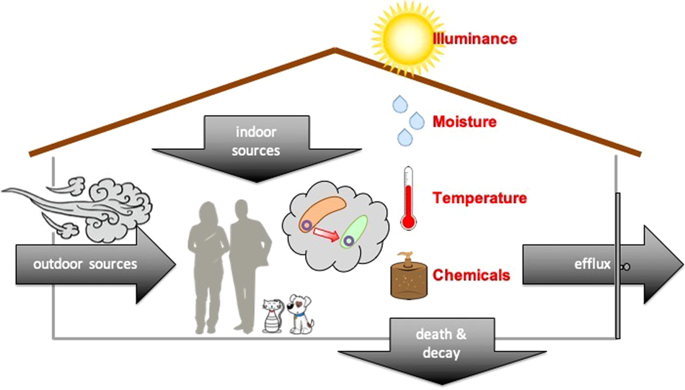当前位置:
X-MOL 学术
›
J. Expo. Sci. Environ. Epid.
›
论文详情
Our official English website, www.x-mol.net, welcomes your
feedback! (Note: you will need to create a separate account there.)
Implications of indoor microbial ecology and evolution on antibiotic resistance.
Journal of Exposure Science and Environmental Epidemiology ( IF 4.1 ) Pub Date : 2019-10-07 , DOI: 10.1038/s41370-019-0171-0 Sarah Ben Maamar 1 , Jinglin Hu 1 , Erica M Hartmann 1
Journal of Exposure Science and Environmental Epidemiology ( IF 4.1 ) Pub Date : 2019-10-07 , DOI: 10.1038/s41370-019-0171-0 Sarah Ben Maamar 1 , Jinglin Hu 1 , Erica M Hartmann 1
Affiliation

|
The indoor environment is an important source of microbial exposures for its human occupants. While we naturally want to favor positive health outcomes, built environment design and operation may counter-intuitively favor negative health outcomes, particularly with regard to antibiotic resistance. Indoor environments contain microbes from both human and non-human origins, providing a unique venue for microbial interactions, including horizontal gene transfer. Furthermore, stressors present in the built environment could favor the exchange of genetic material in general and the retention of antibiotic resistance genes in particular. Intrinsic and acquired antibiotic resistance both pose a potential threat to human health; these phenomena need to be considered and controlled separately. The presence of both environmental and human-associated microbes, along with their associated antibiotic resistance genes, in the face of stressors, including antimicrobial chemicals, creates a unique opportunity for the undesirable spread of antibiotic resistance. In this review, we summarize studies and findings related to various interactions between human-associated bacteria, environmental bacteria, and built environment conditions, and particularly their relation to antibiotic resistance, aiming to guide "healthy" building design.
中文翻译:

室内微生物生态学和进化对抗生素耐药性的影响。
室内环境是人类居住者微生物暴露的重要来源。虽然我们自然希望有利于积极的健康结果,但建筑环境的设计和操作可能会违反直觉,有利于消极的健康结果,特别是在抗生素耐药性方面。室内环境包含来自人类和非人类的微生物,为微生物相互作用(包括水平基因转移)提供了独特的场所。此外,建筑环境中存在的压力可能有利于遗传物质的交换,特别是抗生素抗性基因的保留。内在的和获得性的抗生素耐药性都对人类健康构成潜在威胁;这些现象需要单独考虑和控制。环境和人类相关微生物及其相关抗生素抗性基因的存在,面对包括抗菌化学物质在内的压力源,为抗生素抗性的不良传播创造了独特的机会。在这篇综述中,我们总结了与人类相关细菌、环境细菌和建筑环境条件之间的各种相互作用相关的研究和发现,特别是它们与抗生素耐药性的关系,旨在指导“健康”的建筑设计。
更新日期:2019-10-07
中文翻译:

室内微生物生态学和进化对抗生素耐药性的影响。
室内环境是人类居住者微生物暴露的重要来源。虽然我们自然希望有利于积极的健康结果,但建筑环境的设计和操作可能会违反直觉,有利于消极的健康结果,特别是在抗生素耐药性方面。室内环境包含来自人类和非人类的微生物,为微生物相互作用(包括水平基因转移)提供了独特的场所。此外,建筑环境中存在的压力可能有利于遗传物质的交换,特别是抗生素抗性基因的保留。内在的和获得性的抗生素耐药性都对人类健康构成潜在威胁;这些现象需要单独考虑和控制。环境和人类相关微生物及其相关抗生素抗性基因的存在,面对包括抗菌化学物质在内的压力源,为抗生素抗性的不良传播创造了独特的机会。在这篇综述中,我们总结了与人类相关细菌、环境细菌和建筑环境条件之间的各种相互作用相关的研究和发现,特别是它们与抗生素耐药性的关系,旨在指导“健康”的建筑设计。











































 京公网安备 11010802027423号
京公网安备 11010802027423号